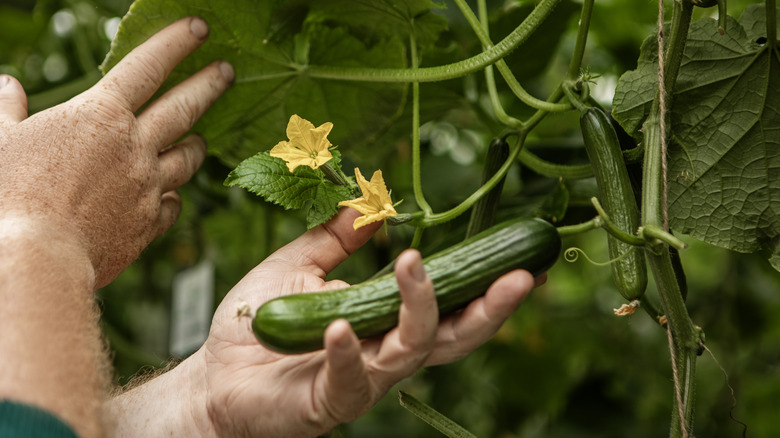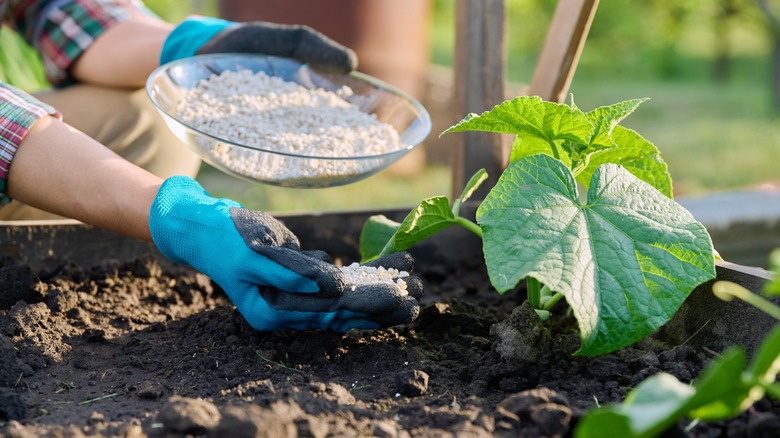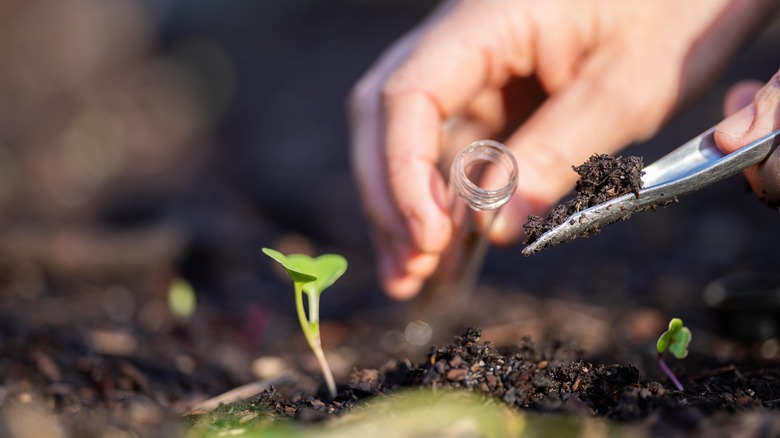Why Fertilizer Could Cause A Problem For Growing Cucumbers
Cucumbers seem to be on just about every gardening beginner's list, due in no small part to their many benefits. They taste great, are pretty low-maintenance, and typically all you need to grow them is some rich soil, plenty of sunshine, and a good watering schedule. Oh, and one crucial thing — using the right amount of fertilizer.
Fertilizer is an essential component of gardening because it provides the necessary nutrients for plants to grow and thrive. In fact, most soils do not have enough natural nutrients to support healthy plant growth, which is why fertilizers are needed. They contain a magical combination of nitrogen, phosphorus, and potassium (NPK) — also known as macronutrients – that are vital for plants' overall health. But while fertilizers can be beneficial for your cucumbers and other plants, if you over-fertilize your garden, you can turn your cukes from hero to zero in no time.
What does too much fertilizer do to cucumbers?
Cucumbers are sensitive souls when it comes to fertilizer. Overdoing it can increase soil salinity, which is just a fancy way of saying the level of salt in the soil. This usually happens due to an overdose of nitrogen, turning your cucumber dream into a nightmare. High enough salinity is toxic to cucumber plants, causing dull, leathery leaves that are more susceptible to wilting. A pale green or yellow edge around the leaf is a tell-tale sign of excess salt in the soil.
Excess nitrogen in the soil can wreak havoc on your cucumber plants as well. First, it encourages lush, green foliage at the expense of fruit production. While those leafy greens might look impressive, they essentially steal the spotlight from the cucumbers themselves. Moreover, the high nitrogen levels can cause an imbalance in essential nutrients, making it harder for the plant to absorb other critical elements like potassium and phosphorus. This nutrient imbalance can lead to weaker plants that are more susceptible to diseases and pests. Ultimately, too much nitrogen can result in fewer cucumbers that are often misshapen or bitter-tasting, leaving you with a less-than-satisfying harvest.
How to treat over-fertilized cucumbers
If you think you might have already over-fertilized your cucumbers, there are a few ways to fix it if you catch it early enough. You can leach the soil or growing medium with large quantities of fresh water to wash out the excess fertilizer. You should also remove any damaged or dead foliage.
Moving forward, you'll also want to check for excess fertilizer or high nitrogen levels. One way is by using an at-home soil test kit. Alternatively, you could send a soil sample to a lab to analyze and provide an accurate measurement of the nutrient levels. You should also always be reading the labels on any and all fertilizers you use, and understand that even from season to season and crop to crop, the needs of your cucumbers might change and you could have to adjust.
If you're wary of commercial fertilizers, consider going with some more natural fertilizers. Compost is an excellent alternative and is like a multivitamin for your plants. It's packed with nutrients and improves soil structure with less risk of turning your garden into a salinity disaster zone. Another great option is using aged manure. It's like giving your cucumbers a spa day — full of nutrients but gentle on their delicate sensibilities.


